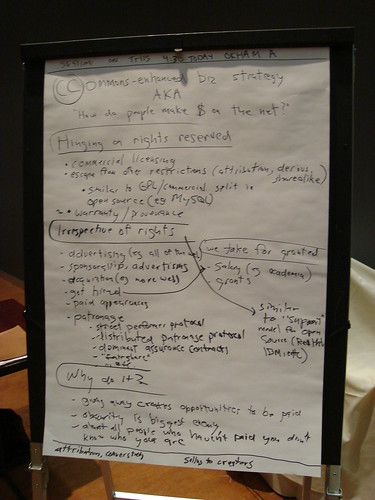Help us protect the commons. Make a tax deductible gift to fund our work. Donate today!
Canadian history writer Christopher Moore, a really nice guy, writes in a Creators’ Copyright Coalition Op-Ed:
I discussed much the same issue with Mike Linksvayer of Creative Commons USA at Copycamp last month. Nice guy, full of enthusiasm for the technology. But we never could clarify just how the “commercial rights reserved” part of a CC licence would actually work.
Close. We failed to clarify how a CC NonCommercial licence would directly replace a portion of Chris’ current revenue, which if I understood and recall correctly, derives from educational institutions
paying for photocopy and other use of Chris’ works via fees to a collective.
The disconnect is twofold. First, a CC NC licence may permit a nonprofit educational institution to use so licenced works under the licence — without fee. Second, the collective arrangement is working for Chris. He gets some supplemental revenue and presumably very little paperwork comes with it. He has little incentive to try something different that does not have this collecting infrastructure.
It is no surprise that CC licences are not appropriate for everyone. They are another option, built on copyright, and 100 percent voluntary. Writers may wish to not avail themselves of the option for
works already bringing in steady revenue from collective licensing arrangements. Chris continues:
It’s not practical for a user wanting to license commercial uses of perhaps dozens of CC items to chase down each author and try to negotiate a fee. But since CC does not have a collective licensing arm, there seems to be no convenient mechanism for users who want
to comply. Making compliance hard leads to non-compliance, doesn’t it?
I sense an entrepreneurial opportunity for the provision of low transaction cost commercial licencing of CC licenced works. Perhaps some existing collecting socities are well placed to execute on this opportunity. Or perhaps upstarts will do well in this market as established players wait to see what happens. Most likely, some of each.
ScooptWords is one example from the upstart category launched this summer and heralded by CC. Last quote from Chris:
I mean this seriously. I think CC has many useful applications for making things freely available. But is there anyone out there who has ever reserved commercial rights under a CC license and then actually received payment for those rights?
Yes! For example, artists on the Magnatune record label. Magnatune’s business model is releasing music under a NonCommercial licence and selling commercial rights. See a Magnatune blog post highlights some interesting recent deals and an interview with Magnatune founder John Buckman. Unsurprisingly most artists on Magnatune also want a low transaction cost solution: Buckman says the vast majority of artists react to the business model with “Whatever, you take care of the details.”
Two other recent commercial licensing instances mentioned on this blog are BeatPick music and Mercedes Benz and Lonelygirl15’s licensing of music from ccMixter users.
Of course there ought to be Magnatunes and Scoopts for most creative formats and genres that use copyright. This is certainly part of the plan. It takes time to build infrastructure, especially decentralized infrastructure, but much more will be visible in this area in the coming months.
It must also be mentioned that selling copies or commercial rights are not the only business strategies available to creators, nor even how most creators get paid now, let alone in the future. This was a hot topic of conversation at CopyCamp, so I did a “Speed Geek” session on it — rapid fire five minute presentations repeated for small groups until all attendees had seen all presentations — an exhausting and fun hour plus. My flip chart after the Speed Geek finished:
Posted 21 October 2006